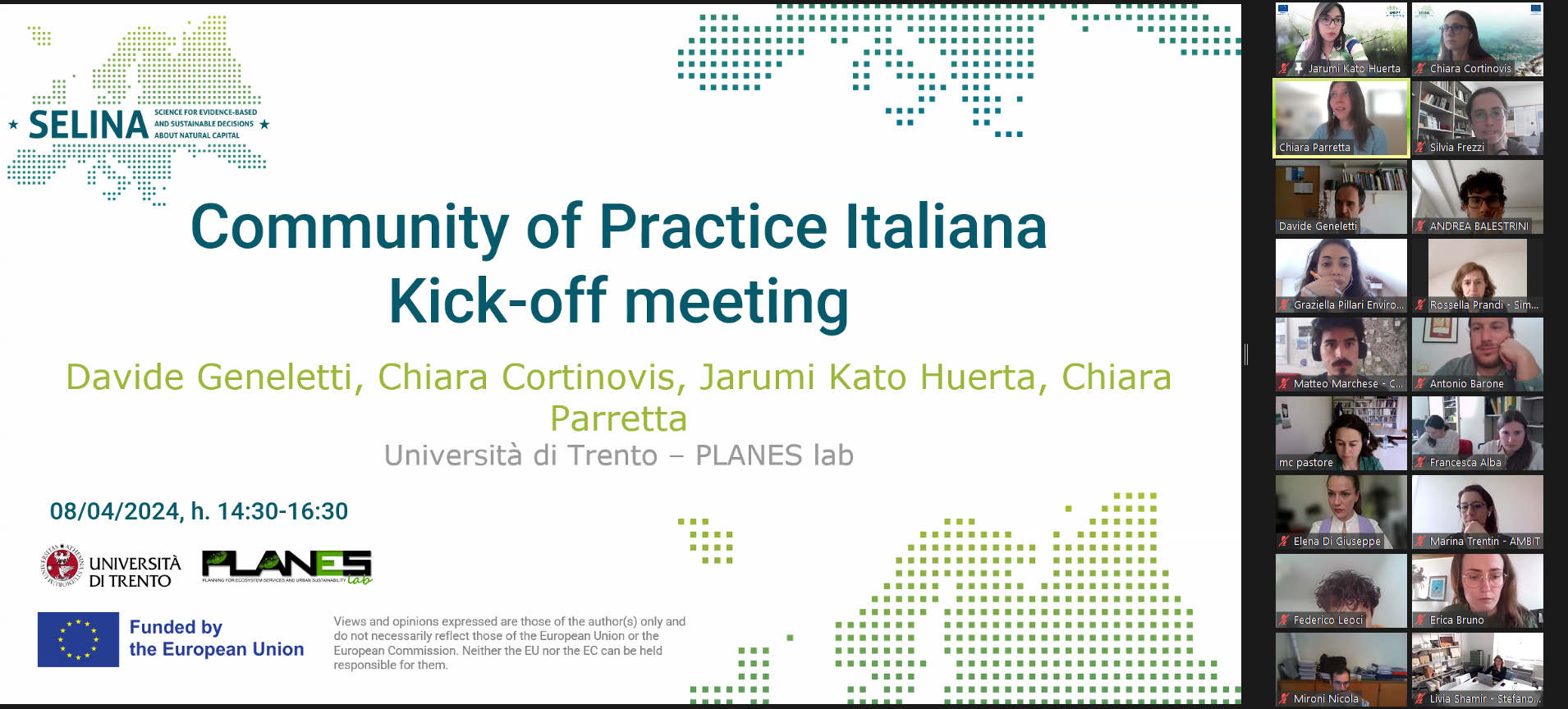Welcome to the official webpage of the Italy ESP national network (IESP). If you would like to visit this network’s discussion board, please click here (members only).
Lead team
- Davide Geneletti, University of Trento, Italy
- Jarumi Kato Huerta, University of Trento, Italy
If you are interested in becoming a member of the lead team please contact the current lead team members.
If you are interested in becoming a member of this national network please click here.
Introduction & Objectives
ESP National Networks aim to improve decision making on ecosystem services by providing a platform for researchers, government, non-government, business, industry and communities to exchange information and experiences on the theoretical and practical application of ecosystem services at local to national scales.
IESP aims at developing a platform for researchers, practitioners and public officers interested in ecosystem services, and their applications. Our objective is to promote collaborations across institutions active in this field, and design nation-wide initiatives that might be relevant for the Italian context. Our activities will be demand-driven, and reflect the interests and motivation of the members.
Activities & Outputs
1. Survey of the ecosystem services research in Italy
Coordinator: Planes (University of Trento)
- Poster summarising the survey’s results
- Survey statistics, list of research groups with illustrative ES studies
2. Italian network of early-career researchers on ecosystem services in spatial planning and land management
The network gathers postdocs and early-career researchers working in Italian institutions who deal with the integration of ecosystem services in spatial planning and land management from different sectoral and disciplinary perspectives (urban planning, forestry, coastal management, …). The informal community welcomes all ECRs interested in sharing experiences and discussing ecosystem services-related topics in a friendly and open environment.
Among the activities are seminars, workshops and small learning classes where members are invited to share their research findings, joint proposals for conference sessions and special issues, as well as policy briefs and joint papers. While strongly embedded in the international scientific debate, the network also has the ambition to provide a common ground for the new generation of researchers to discuss local policies and practices, highlighting criticalities and identifying opportunities for innovation. General meetings are held online every three months and in person once a year as a side event of a conference.
If you are curious to know more about the network or would like to join the activities, please contact Chiara Cortinovis ([email protected]), Claudia De Luca ([email protected]), or Silvia Ronchi ([email protected]).
3. Kick-off of the Italian Community of Practice
On Monday, April 8th, 2024, under the activities of the SELINA project, the Italian Community of Practice kicked off with 42 participants representing diverse sectors, including associations and non-profits, the private sector, research institutions, and public sector representatives. This first CoP meeting focused on getting to know each other, finding cross-cutting objectives, and fixing how to operate within the community to foster collaboration and knowledge exchange.
Participants were introduced to SELINA’s activities, including the CoP’s role. Afterwards, the discussions with participants focused on aligning specific objectives and future activities with the CoP’s general theme of planning processes at various scales.
Participants expressed their will to establish a knowledge exchange network and interdisciplinary dialogue to enhance biodiversity and ecosystem service management. They prioritize analyzing decision-making processes to improve territorial planning, support policymakers, and seek collaboration for project cooperation and methodological innovation within the CoP. Key topics include climate change impacts, urban biodiversity, decision support tools, Nature-Based Solutions, economic valuation methods, and agro-biodiversity recognition. Desired activities encompass developing assessment methodologies, organizing seminars, creating working groups, compiling best practices, and promoting peer learning.
If you are interested in being part of the Italian Community of Practice, please contact Chiara Parretta ([email protected])

4. Upcoming webinar on economic instruments in spatial planning for enhancing biodiversity value.
The University of Trento, as a partner of the Horizon 2030 BioValue project, is inviting interested parties to attend a webinar entitled “Exploring economic instruments in spatial planning for enhancing biodiversity value.”, organised by the Helmholtz Centre for Environmental Research (UFZ). The webinar will be held on September 5th from 14:00 to 15:30 CET time.
Registrations are expected before the 2nd of September by clicking on this link.
The webinar will include three parallel working-group sessions, which will be selected during the registration process. Participants will also receive a link to join the meeting.
